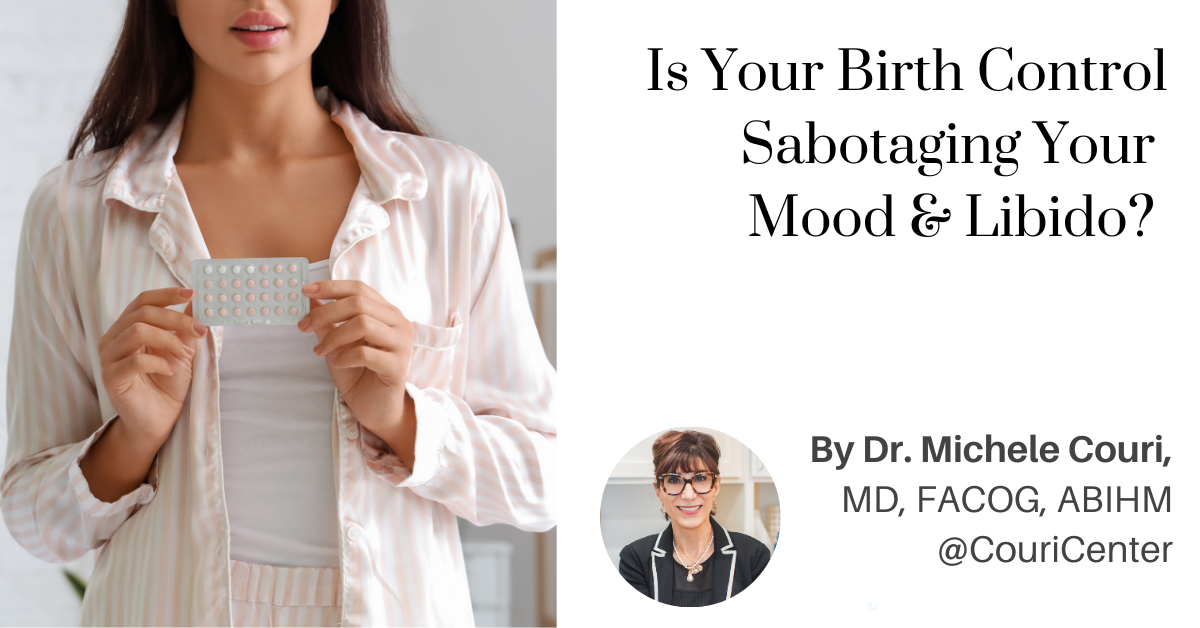
Summary
Is your birth control pill affecting your mood and libido? In Dr. Couri’s blog post for the Couri Center, she delves into the impact of combined oral contraception (COC) on women's emotional and sexual health. Discover how the pill can suppress testosterone production, leading to decreased libido and mood changes, and explore potential solutions like DHEA supplements or bioidentical testosterone therapy. Personalized care is key to effective healthcare, ensuring women feel heard and empowered on their health journey.
Understanding Combined Oral Contraception (COC) and Its Popularity
Combined oral contraception (COC), aka “birth control pills” or “the pill,” is a very common form of contraception worldwide. According to the CDC, between 2017 and 2019, 19.5% of women aged 15–19 and 21.6% of women aged 20–29 used the pill, compared with 10.9% of those aged 30–39, and 6.5% of women aged 40–49. Traditional birth control pills use a combination of synthetic forms of estrogen and progesterone to prevent ovulation. While combined oral contraceptives may be a convenient form of contraception, they can be associated with a variety of side effects.
How Birth Control Pills Affect Women’s Testosterone Levels
In my 23 years as a practicing Gynecologist, I have commonly heard patients on the pill report decreased libido and depressed mood after starting this form of contraception. These side effects can be multifactorial, but one very plausible explanation is that when taking COCs, endogenous production of testosterone is almost completely suppressed. Studies have shown that COCs can suppress total testosterone production by 55-62% and free testosterone by 68-86%. Testosterone is a critically important hormone in women as it is linked to our sexual, emotional, and cognitive health.
The Impact of Suboptimal Testosterone on Libido and Mood
Suboptimal testosterone levels can be associated with hypoactive sexual desire disorder (decreased libido), mood changes such as depression and anxiety, brain fog, impaired sleep, decreased muscle strength, and poor exercise recovery.
Potential Solutions: DHEA Supplementation and Bioidentical Testosterone
For younger patients on COCs, taking 50 mg of a supplement called DHEA can help negate the COC-related testosterone loss, with the potential to restore libido and mood. Perimenopausal patients on COCs could also consider taking DHEA or could replace testosterone directly using bioidentical options such as testosterone pellets or a testosterone cream.
The Importance of Personalized Healthcare
As always, it is imperative to Individualize each woman’s care based on her symptoms and goals, as this is essential for providing effective and meaningful healthcare. This personalized approach not only enhances the quality of care but also empowers women to actively participate in their health journey, leading to better adherence to treatment plans and more positive health outcomes. Being heard is the first step to being healed.
If you have concerns about your birth control and its effects on your mood or libido, schedule a consultation with us at the Couri Center. We’re here to help!
To Your Health,
Dr. Couri
DISCLAIMER: THE INFORMATION PROVIDED ON THIS WEBSITE IS INTENDED FOR GENERAL INFORMATIONAL PURPOSES ONLY AND IS NOT INTENDED TO BE A SUBSTITUTE FOR PROFESSIONAL MEDICAL ADVICE, DIAGNOSIS, OR TREATMENT. THE INFORMATION PROVIDED IS CURRENT AS OF THE DATE OF PUBLICATION OR LAST REVIEW, BUT MEDICAL KNOWLEDGE IS CONSTANTLY EVOLVING, AND THE INFORMATION MAY BECOME OUTDATED OVER TIME.
Sources
Y.Zimmerman, M.J.C. Eijkemans, H.J.T. Coelingh Bennink, M.A. Blankenstein, B.C.J.M. Fauser. The effect of combined oral contraception on testosterone levels in healthy women: a systematic review and meta-analysis. Human Reproduction Update, Volume 20, Issue 1, January/February 2014, Pages 76–105.
Davis SR. Testosterone for women: certainties and uncertainties. Climacteric. 2023;26(1):21–24.
H. J. T. Coelingh Bennink. A few certainties about testosterone in women. Climacteric, Volume 26, 2023. Page 168.
CBC. gov. Current Contraceptive Status Among Women Aged 15–49: United States, 2017–2019.
